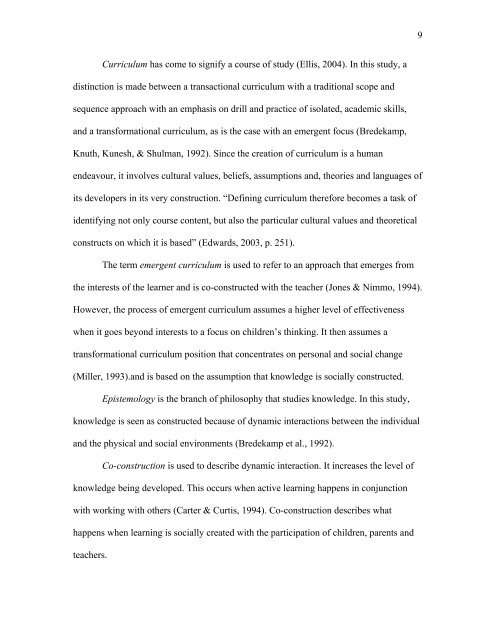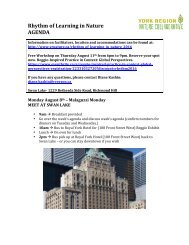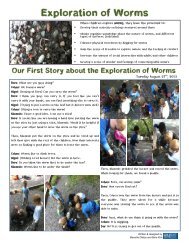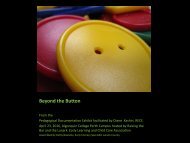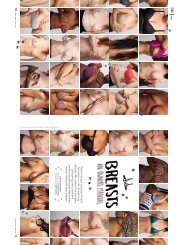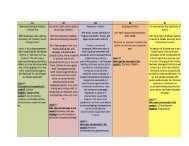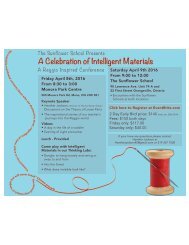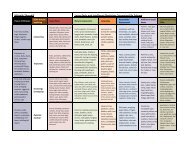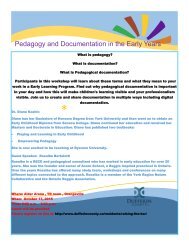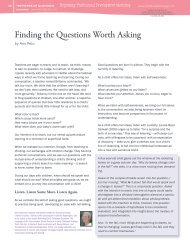- Page 1 and 2: REACHING THE TOP OF THE MOUNTAIN: T
- Page 3 and 4: Acknowledgements I wish to express
- Page 5 and 6: Teacher as Theory Builder .........
- Page 7 and 8: Dedication This dissertation is ded
- Page 9 and 10: 2 are inextricably linked to issues
- Page 11 and 12: 4 2. What is the perception of the
- Page 13 and 14: 6 educators who have adapted a refr
- Page 15: 8 constructive process. It is based
- Page 19 and 20: 12 through active involvement with
- Page 21 and 22: 14 Relevance of Study When I took a
- Page 23 and 24: 16 the centre of the labyrinth can
- Page 25 and 26: 18 without walls, the teacher calle
- Page 27 and 28: 20 As a very young child, the teach
- Page 29 and 30: 22 of completing my education and r
- Page 31 and 32: 24 what the learner already knows t
- Page 33 and 34: 26 unsure of my direction; still I
- Page 35 and 36: 28 the centre or return to the entr
- Page 37 and 38: 30 here, though, is that these expe
- Page 39 and 40: 32 of fixing children by teaching t
- Page 41 and 42: 34 relates to those aspects of acti
- Page 43 and 44: 36 As I articulate my experiences w
- Page 45 and 46: 38 An essential part of who I am an
- Page 47 and 48: 40 teacher-centred practice. Teache
- Page 49 and 50: 42 well was gradually undergoing re
- Page 51 and 52: 44 While education staff in public
- Page 53 and 54: 46 school settings, has an equally
- Page 55 and 56: 48 In Ontario, over 90% of the 300,
- Page 57 and 58: 50 knowledge and skills not possess
- Page 59 and 60: 52 staff members who do not have sp
- Page 61 and 62: 54 Content and pedagogy should be i
- Page 63 and 64: 56 order to remain competitive, it
- Page 65 and 66: 58 those employed in child care are
- Page 67 and 68:
60 and/or co-workers (Doherty & For
- Page 69 and 70:
62 exacerbated by the findings that
- Page 71 and 72:
64 Québec a public education campa
- Page 73 and 74:
66 You Bet I Care! (2000) examined
- Page 75 and 76:
68 coupled with feelings of inadequ
- Page 77 and 78:
70 dimension as “it takes place i
- Page 79 and 80:
72 thirds of assistant teachers and
- Page 81 and 82:
74 psychological and physical safet
- Page 83 and 84:
76 Certification. Certification is
- Page 85 and 86:
78 aspire to (CCCF, 1995). The beli
- Page 87 and 88:
80 According to Bertrand (2003), co
- Page 89 and 90:
82 difficulty with recruitment and
- Page 91 and 92:
84 childhood educators. Perhaps a v
- Page 93 and 94:
86 teaching staff in order to help
- Page 95 and 96:
88 The disappointing findings helpe
- Page 97 and 98:
90 curriculum. The former rather th
- Page 99 and 100:
92 evolves, diverging along new pat
- Page 101 and 102:
94 require the abandonment of a wid
- Page 103 and 104:
96 consideration of how children le
- Page 105 and 106:
98 may involve recognition of child
- Page 107 and 108:
100 prematurely is that those who c
- Page 109 and 110:
102 1996). Some of the criticism su
- Page 111 and 112:
104 best from activities they thems
- Page 113 and 114:
106 The Reggio Emilia Approach The
- Page 115 and 116:
108 4. documentation: teachers and
- Page 117 and 118:
110 change their interactions based
- Page 119 and 120:
112 Documentation in this form is n
- Page 121 and 122:
114 own evolving authentic curricul
- Page 123 and 124:
116 lead “into an expanding world
- Page 125 and 126:
118 gap between what “the child i
- Page 127 and 128:
120 to visit the programs appeared
- Page 129 and 130:
122 lack of research and its limite
- Page 131 and 132:
124 classroom, teachers learn and r
- Page 133 and 134:
126 issues, a self-directed orienta
- Page 135 and 136:
128 changes within the school as a
- Page 137 and 138:
130 of practice within communities
- Page 139 and 140:
132 outcomes for programs with a so
- Page 141 and 142:
134 This program began in 1975 and
- Page 143 and 144:
136 reflective practice involving j
- Page 145 and 146:
138 beginning teachers.” Interest
- Page 147 and 148:
140 In the Forward to Developmental
- Page 149 and 150:
Chapter Four: Methodology What you
- Page 151 and 152:
144 (multiple realities are sociall
- Page 153 and 154:
146 are issue oriented and are “n
- Page 155 and 156:
148 implications to halting the pra
- Page 157 and 158:
150 my research participants and wi
- Page 159 and 160:
152 was the child, not her teacher.
- Page 161 and 162:
154 In making the study accessible,
- Page 163 and 164:
156 these categories: current pract
- Page 165 and 166:
158 widely used by market researche
- Page 167 and 168:
160 particular project topic brough
- Page 169 and 170:
162 collaboration involving mutual
- Page 171 and 172:
164 The Weary Traveler: Roadblock F
- Page 173 and 174:
166 Conclusion In collecting data,
- Page 175 and 176:
168 the experience of teachers who
- Page 177 and 178:
170 twenty bucks for Chinese New Ye
- Page 179 and 180:
172 The centre now occupies space i
- Page 181 and 182:
174 for the kid’s interests. You
- Page 183 and 184:
176 analyzed by the group. At the p
- Page 185 and 186:
178 Figure 5. The weather project d
- Page 187 and 188:
180 program more theirs” Subseque
- Page 189 and 190:
182 teachers, the rest see them as
- Page 191 and 192:
184 It makes you pumped. Sometimes
- Page 193 and 194:
186 Case Study Number Two: The Spir
- Page 195 and 196:
188 the various levels of the organ
- Page 197 and 198:
190 volunteers her time to facilita
- Page 199 and 200:
192 willing to learn. It is not som
- Page 201 and 202:
194 Challenges. Given the limited h
- Page 203 and 204:
196 educational model, the oppositi
- Page 205 and 206:
198 Emerging directions. Rose has n
- Page 207 and 208:
200 There was a discernable absence
- Page 209 and 210:
202 preschool age children (2 1/2 t
- Page 211 and 212:
204 Mary was satisfied with this th
- Page 213 and 214:
206 community helper is.” Communi
- Page 215 and 216:
208 Recognizing the children’s in
- Page 217 and 218:
210 Mary believes that child care h
- Page 219 and 220:
212 The children are the seeds. The
- Page 221 and 222:
214 Mary would advise others to est
- Page 223 and 224:
216 Figure 17. Splat, splat like Ja
- Page 225 and 226:
218 As a result of fees and capacit
- Page 227 and 228:
220 work. Felicia was solicited by
- Page 229 and 230:
222 Felicia’s co-worker was the f
- Page 231 and 232:
224 curriculums and criticism was i
- Page 233 and 234:
226 children could have a really ex
- Page 235 and 236:
228 feelings of confidence mixed wi
- Page 237 and 238:
230 you can answer that question ho
- Page 239 and 240:
Chapter Six: Discussion If nature h
- Page 241 and 242:
234 The Impact of Context The situa
- Page 243 and 244:
236 Feeling valued and supported in
- Page 245 and 246:
238 impacted Rose’s attitude towa
- Page 247 and 248:
240 in the field. Rose has been tak
- Page 249 and 250:
242 practice with the chance to att
- Page 251 and 252:
244 are interested and they are pas
- Page 253 and 254:
246 primarily to the teachers. Mary
- Page 255 and 256:
248 learners. While this is a “de
- Page 257 and 258:
250 “not engaged” with an emerg
- Page 259 and 260:
252 alternative perspective, a teac
- Page 261 and 262:
254 had difficulty reconciling the
- Page 263 and 264:
256 the project determined its dire
- Page 265 and 266:
258 Layla recalled the experience o
- Page 267 and 268:
260 information. A newsletter produ
- Page 269 and 270:
262 order to ascertain future direc
- Page 271 and 272:
264 (Rankin, 2004). In Reggio Emili
- Page 273 and 274:
266 theory is just a proposed expla
- Page 275 and 276:
268 Table 1 Katz’s Model of Teach
- Page 277 and 278:
270 Katz’s conceptualization (200
- Page 279 and 280:
272 Table 2 Kashin’s Model of Eme
- Page 281 and 282:
274 availability could produce the
- Page 283 and 284:
Chapter Seven: Future Directions If
- Page 285 and 286:
278 as I have been, to detach thems
- Page 287 and 288:
280 objects created by adults remov
- Page 289 and 290:
282 winter semester of 2006, I am o
- Page 291 and 292:
284 Emilia to early childhood educa
- Page 293 and 294:
286 within a Reggio-inspired enviro
- Page 295 and 296:
288 However, the ship cannot be rep
- Page 297 and 298:
290 curriculum choices from a broad
- Page 299 and 300:
292 editor, a friend, and the parti
- Page 301 and 302:
294 As I envision the future, it ho
- Page 303 and 304:
296 of custom, of the normal, of th
- Page 305 and 306:
298 theory in practice take place f
- Page 307 and 308:
300 The question being pondered was
- Page 309 and 310:
302 developmentally appropriate to
- Page 311 and 312:
304 with this perception of my fiel
- Page 313 and 314:
References Adcock, S. G., & Patton,
- Page 315 and 316:
308 appropriate practice in early c
- Page 317 and 318:
310 Corbett, B. E. (1989). A centur
- Page 319 and 320:
312 Ferguson, E. (1994). Child care
- Page 321 and 322:
314 Griffin, S. (2002). To be or no
- Page 323 and 324:
316 Katz, L. (1999). Curriculum dis
- Page 325 and 326:
318 Miller, S. M., & Shoptaugh, S.
- Page 327 and 328:
320 Palmer, P. J. (1998). The coura
- Page 329 and 330:
322 Schön, D.A. (1996). Educating
- Page 331 and 332:
324 Weber, S., & Mitchell, C. (1995
- Page 333 and 334:
Appendix A: Invitation to Participa
- Page 335 and 336:
328 I am free to decline to answer
- Page 337 and 338:
330 4. What are the strengths of th
- Page 339 and 340:
Appendix E: The Image of the Teache
- Page 341 and 342:
334 Image: 1. How does the image ot
- Page 343 and 344:
336 obvious to me and I react with
- Page 345 and 346:
338 Layla: That was the place with
- Page 347 and 348:
340 table relates to the topic. The
- Page 349 and 350:
342 supply teacher has a child in h
- Page 351 and 352:
344 the children regarding the char
- Page 353 and 354:
346 conversation about A R T contin
- Page 355:
348 22 going on, puzzles or another


